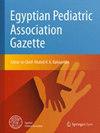孟鲁司特在早产儿脓毒症反应调节中的作用:一项随机对照试验
IF 0.5
Q4 PEDIATRICS
引用次数: 0
摘要
因为炎症介质在新生儿败血症的病理生理中起着至关重要的作用。孟鲁司特作为一种消炎药,可能是一种有益的治疗方法。在检索文献时,没有先前的研究涉及孟鲁司特在新生儿败血症中的作用;因此,本研究旨在探讨孟鲁司特在调节新生儿脓毒症相关炎症反应中的辅助作用及其对临床结局的相关影响。一项开放标签、随机对照干预试验对40例晚期早产新生儿(胎龄340/7 ~ 366/7周)入院NICU,临床证据为败血症。在孟鲁司特组(n = 20)中,婴儿每天口服一次孟鲁司特,持续10天(婴儿体重2 kg,服用2mg),并给予抗生素和常规支持治疗。在常规护理组(n = 20),婴儿接受抗生素加常规支持治疗。主要终点是治疗第10天的血清肿瘤坏死因子(TNF) α水平。住院期间报告二次临床和实验室结果。两组的基线特征无显著差异。治疗10天后,孟鲁司特组TNF α水平显著降低(80.73±50.25 vs 119.54±58.46;p = 0.03)。两组在新生儿重症监护病房住院时间、抗生素使用时间或方式以及呼吸支持持续时间方面无显著差异。两组间c反应蛋白差异无统计学意义(p = 0.256)。在研究期间,孟鲁司特没有明显的不良反应。在患有脓毒症的晚期早产新生儿中,孟鲁司特作为抗生素辅助治疗10天可降低TNF α水平,但对临床结果没有任何影响。该研究已获得曼苏拉医学院机构研究委员会(IRB)批准(MS/17.06.95),并已在临床试验数据库(clinicaltrials.gov, ID: NCT04474327;注册日期:2020年7月16日)。本文章由计算机程序翻译,如有差异,请以英文原文为准。
Role of Montelukast in modulation of response to sepsis in preterm infants: a randomized-controlled trial
Since inflammatory mediators play a crucial role in the pathophysiology of neonatal sepsis. Montelukast, as an anti-inflammatory drug, could be a beneficial therapy. In searching the literature, no previous research addressed the role of Montelukast in neonatal sepsis; hence, this study aimed to explore the adjuvant role of Montelukast in regulating the inflammatory response associated with neonatal sepsis and its associated effect on the clinical outcomes. An open-label, randomized controlled intervention trial conducted on 40 late preterm newborn infants (gestational age 340/7 to 366/7 weeks) admitted to NICU, with clinical evidence of sepsis. In the Montelukast group (n = 20), infants received oral Montelukast once daily for 10 days (infant's weight < 2 kg received 1.5 mg whereas > 2 kg received 2 mg) with antibiotics plus routine supportive care. In the routine care group (n = 20), infants received antibiotics plus routine supportive care. Primary outcome was the serum level of tumor necrosis factor (TNF) alpha at day 10 of therapy. Secondary clinical and laboratory outcomes were reported along hospital admission. Baseline characteristics were non-significantly different between both groups. After 10 days of therapy, TNF alpha level was significantly lower in the Montelukast group (80.73 ± 50.25 versus 119.54 ± 58.46; p = 0.03). There were non-significant differences between both groups regarding duration of NICU admission, antibiotics duration or modalities and duration of respiratory support. C-reactive protein didn’t differ between both groups (p = 0.256). No documented significant adverse effects of Montelukast during the study period. In late preterm neonates with sepsis, 10 days of Montelukast therapy as an adjuvant to antibiotics lowered TNF alpha level without any impact on clinical outcomes. The study was approved by Mansoura Faculty of Medicine institutional research board (IRB) (MS/17.06.95) and it was registered in clinical trials database (clinicaltrials.gov, ID: NCT04474327 ; registered July 16, 2020).
求助全文
通过发布文献求助,成功后即可免费获取论文全文。
去求助
来源期刊

Egyptian Pediatric Association Gazette
PEDIATRICS-
自引率
0.00%
发文量
32
审稿时长
9 weeks
期刊介绍:
The Gazette is the official journal of the Egyptian Pediatric Association. The main purpose of the Gazette is to provide a place for the publication of high-quality papers documenting recent advances and new developments in both pediatrics and pediatric surgery in clinical and experimental settings. An equally important purpose of the Gazette is to publish local and regional issues related to children and child care. The Gazette welcomes original papers, review articles, case reports and short communications as well as short technical reports. Papers submitted to the Gazette are peer-reviewed by a large review board. The Gazette also offers CME quizzes, credits for which can be claimed from either the EPA website or the EPA headquarters. Fields of interest: all aspects of pediatrics, pediatric surgery, child health and child care. The Gazette complies with the Uniform Requirements for Manuscripts submitted to biomedical journals as recommended by the International Committee of Medical Journal Editors (ICMJE).
 求助内容:
求助内容: 应助结果提醒方式:
应助结果提醒方式:


